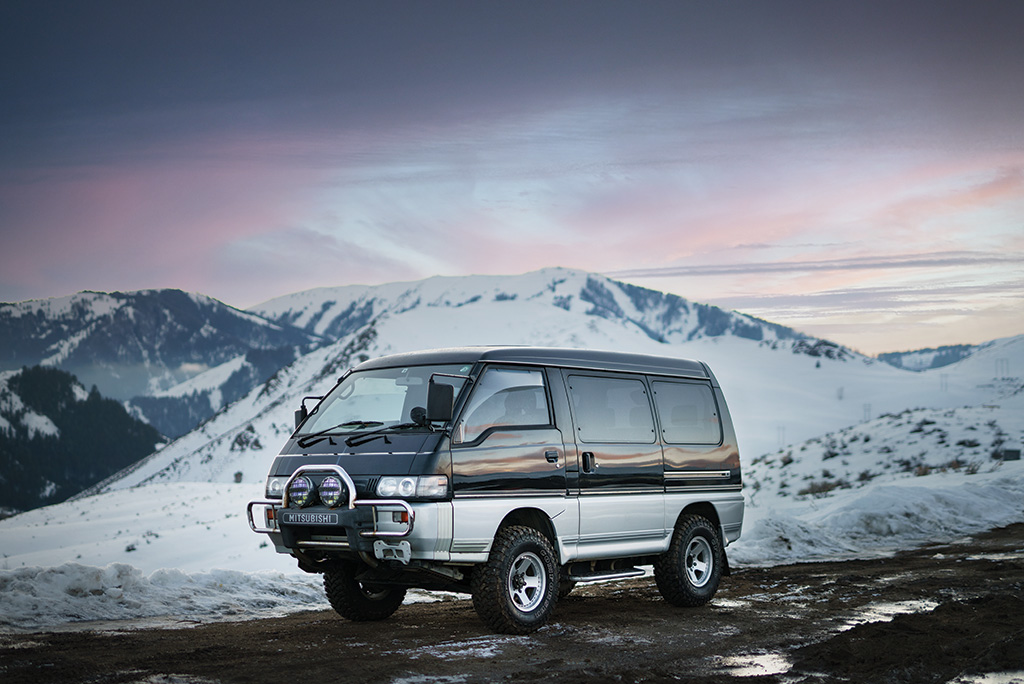With every shifting season in Sun Valley, a new wave of first-time residents makes their way into town with bright eyes and a lust for living in a place encircled by the rugged beauty of the mountains. With limitless opportunities for people to fill the cup of their soul to the brim with outdoor adventure, choosing to call these mountains home is as easy as breathing that fresh mountain air. But making a living between adventures is no easy feat, and if you want to count yourself among the folks that choose to make their stopover in Sun Valley a permanent life choice, you’ll need to sort that out.
While there are still some nine to five jobs to be had in town and remote work is an option, fortune in these mountains favors the bold. Those who truly thrive out here must make their own way, more often than not. Entrepreneurs and small business have long been the backbone of the Wood River Valley. They enrich the character of a community that was founded in the independent spirit of the West.
From the Land of the Rising Sun to the Valley of the Sun: Nomadic Van
Though the Sprinter Van may be the universal symbol of the well-to-do ski town resident, there’s another van that’s becoming equally synonymous with mountain town living: the Delica. At first glance, the delightfully stubby van seems to be simply the hipster-approved version of the ubiquitous and often over-glitzed Sprinters. But the Delica has bona fide off-road chops, and upstart Nomadic Van has made Ketchum a national destination for all things Delica.
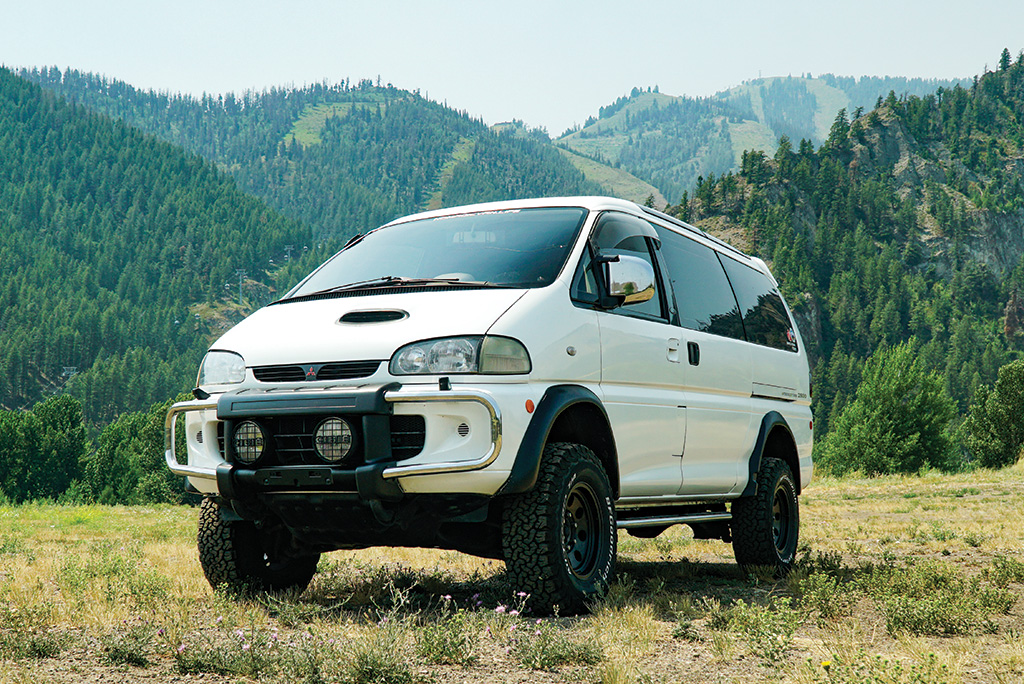
Falling in love leaves an indelible mark on our hearts, and when Nomadic Van co-founder Ron Arnold fell in love in the cozy confines of a Delica half a world away in New Zealand, both the girl and the van changed him. He was hooked on the quirky looks, utilitarian feel, and go-absolutely-anywhere ability of these hard-to-come-by vans.
In 2017, Arnold finally acquired his first Delica and began spending hours in his yard tinkering under the hood, coaxing the van to its peak performance. During this time, good friend and co-founder, Gardner Cord, began coming around, learning the ropes and finer points of diesel maintenance. After countless hours bloodying their knuckles and draining cold beers in Arnold’s yard, the notion of taking their evening hobby full-time as a business seemed only a matter of logic, and in 2019, they created Nomadic Van, the country’s premier Delica-specific dealer.
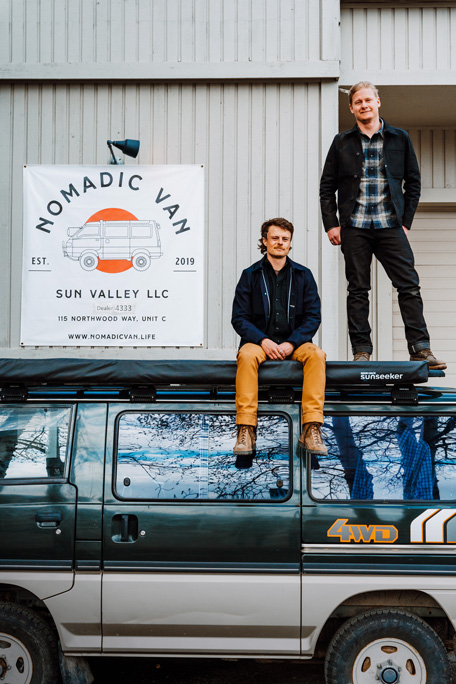
Above, Gardner Cord (left) and Ron Arnold are co-owners of Nomadic Van.
Arnold and Cord give every Delica they sell a complete mechanical overhaul, squeezing out a bit more speed while also making them incredibly reliable. “My Dad taught me to never pass someone on the side of the road who’s broken down,” said Arnold. “So, naturally, we never want to put someone in that position. That’s why we’re so meticulous and thorough with our approach to refurbishing these 25-year-old vehicles.”
Cord acknowledges that the business of importing and selling Japanese vehicles would no doubt be far easier in a town closer to the coast. “It would be 10 times easier if we lived near a port,” said Cord. “But we love being in this valley so much, and our passion wouldn’t be there without this place we call home.”
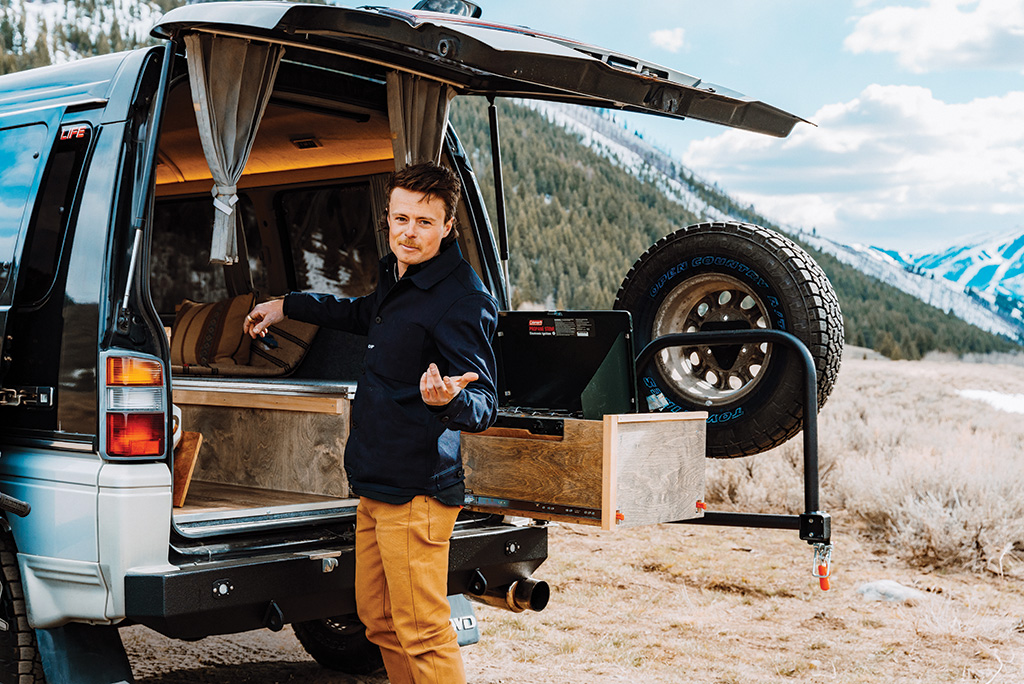
Despite the additional logistical challenges of getting vans from the coast to Ketchum and the generally higher cost of doing business in a small town, Nomadic Van has been a smashing success. Nearly three years into their venture, Arnold and Cord have their sights set on the next chapter of the Nomadic Van story. “We’re already looking to hire more staff and build out a south Valley garage location,” says Cord. Along with this expansion, Nomadic Van is beginning to team up with Dylan Carey of fellow Ketchum-based startup, Strata Rigs, to bring more camper conversion tricks to the fleet of Nomadic Delicas, giving their soon-to-be owners the ability to go even deeper into the backcountry in their quest to achieve van life nirvana.
Tech Threads with Style Points: Wild Rye
Like many seeking to live the quintessential mountain town dream while simultaneously furthering a professional career, Cassie Abel initially found a home with Smith Optics. A veritable Ketchum institution, Smith offered many the chance to work for an internationally recognized company that was founded on the shared values of all who truly love the outdoors. But when Smith’s parent company decided it was time to shutter the brand’s Ketchum HQ in 2014, the employees were either let go or given the option to move to a new office in Portland, Oregon.
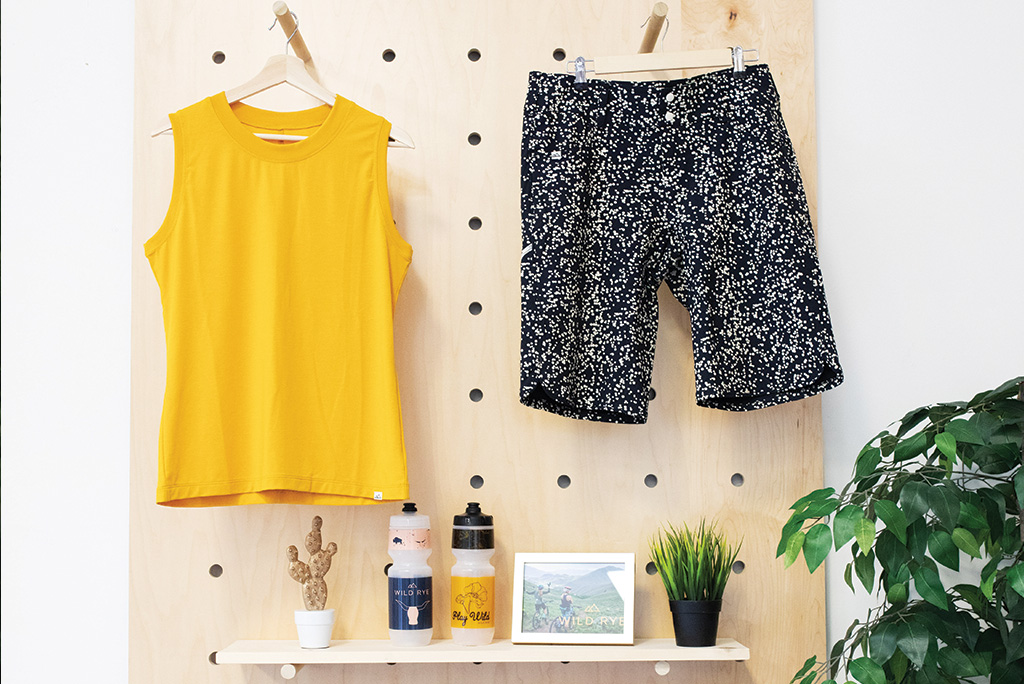
For Abel and many others, the choice was an easy one. There was no way they could leave Ketchum. They would just need to find some other way to make it in the Valley. Immediately Abel’s entrepreneurial instincts kicked in, and she began using the skills she had honed with Smith to start her own PR company and eventually the women’s technical apparel company, Wild Rye.
“Having spent time with Smith working in the outdoor industry, I always felt that women weren’t getting a fair shake,” says Abel, “from the way women are treated in the industry, to the severe lack of dedicated women’s apparel.” Determined to change this, Abel created Wild Rye.

Wild Rye team member Kajay Rooke sends it off a jump at Highland Bike Park, New Hampshire, in August 2021
Beyond creating stylish technical apparel that holds its own in the most demanding circumstances (think 2,000-foot climbs with an afternoon downpour thrown in), Wild Rye is working to change the narrative surrounding women in the outdoors, focusing on inclusion and celebrating all forms of outdoor recreating—not just the gnarliest or fastest.
To say their mix of advocacy and stellar products is proving successful would be an understatement. Since launching in 2016, Wild Rye has more than doubled its sales each year thus far and is now carried at REI and even Nordstroms. Keeping pace with this incredible growth has been no easy task.
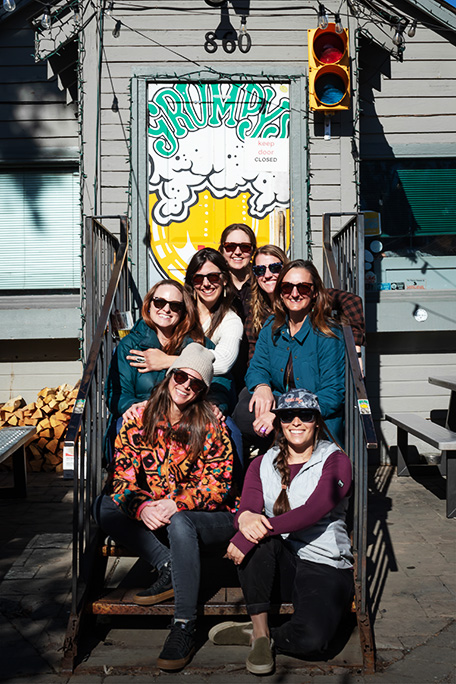
Above, the Wild Rye team in March 2022 at Grumpy’s. Tow row (L-R) Lauren Bertelson, Holly O’Brien, Sarah Hope, Shannon Allen, Cassie Abel. Bottom row (L-R) Kendall Verge, Keeley Vestman
Growing a business in Ketchum comes with a slew of unique challenges. Despite hurdles like nonexistent employee housing and freight shipping nightmares, Abel says the payoff is worth the pain. “So much authenticity comes from being in the mountains, and there’s so much talent,” Abel notes. “Plus, people are able to do much better work when they can get out for a ride or some groomers at lunch.”
She adds that one of her primary goals in creating Wild Rye was to help fill the void created by Smith’s departure and build a business capable of creating local jobs for professionals. Wild Rye will add its seventh full-time employee by summer, confirming that Abel continues to do exactly what she set out to. And Wild Rye’s meteoric rise shows no signs of slowing as they continue to write the next chapter of great outdoor brands born in Ketchum.
Growing Good Things: Floret
In a small town, being able to call yourself a local is a badge of pride. While more recent residents may wonder how long they must reside in the Valley before earning local status, Floret founder Brenna Cavanaugh has been a proud local since day one. Cavanaugh is among many who are born and raised in the Valley that elect to not only stay but also contribute to the community through small business ownership.
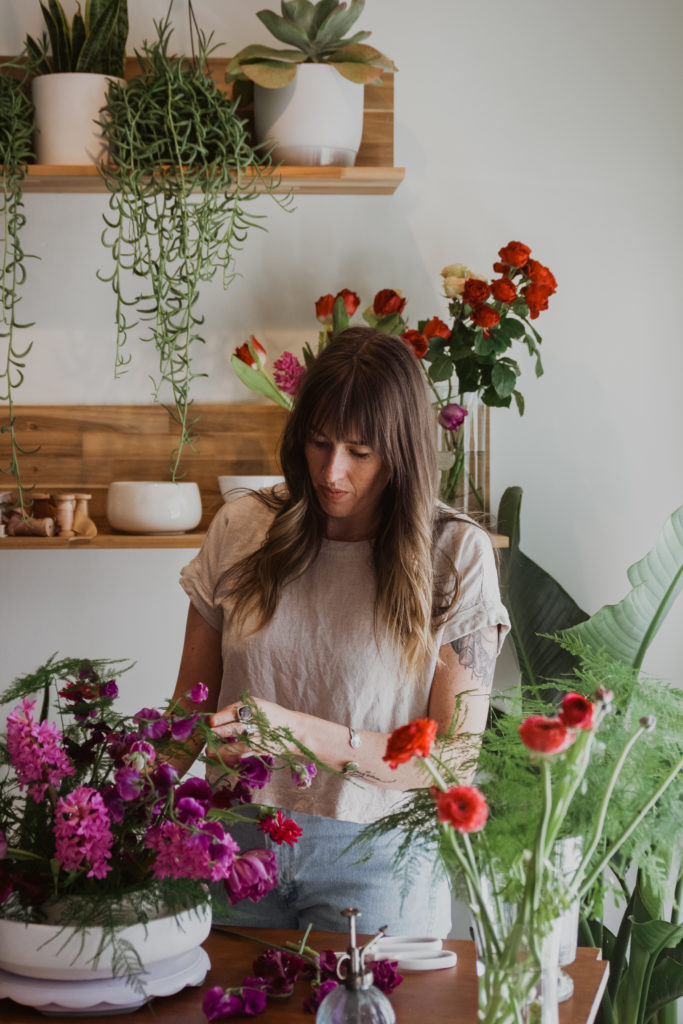
Floret owner Brenna Cavanaugh arranges some local stems at her shop in Ketchum.
After living with her sister amid the hustle and bustle of Amsterdam, Cavanaugh found herself longing to return to small town comforts, and she decided it was time to return home. “I absolutely loved Amsterdam,” said Cavanaugh, “but I realized that the Wood River Valley was where I wanted to be.”
Cavanaugh’s background and formal training is in art design and installation, and she has developed a keen eye for creating visually stunning configurations of forms and colors. She also gained a deep understanding of the flower business through years working with Ketchum Flower Company. Upon her return from Amsterdam, Cavanaugh decided the time was right to create her own business. In 2019, she started Floret Design Studio, which has given her the chance to share her unique point of view through flowers and styling.
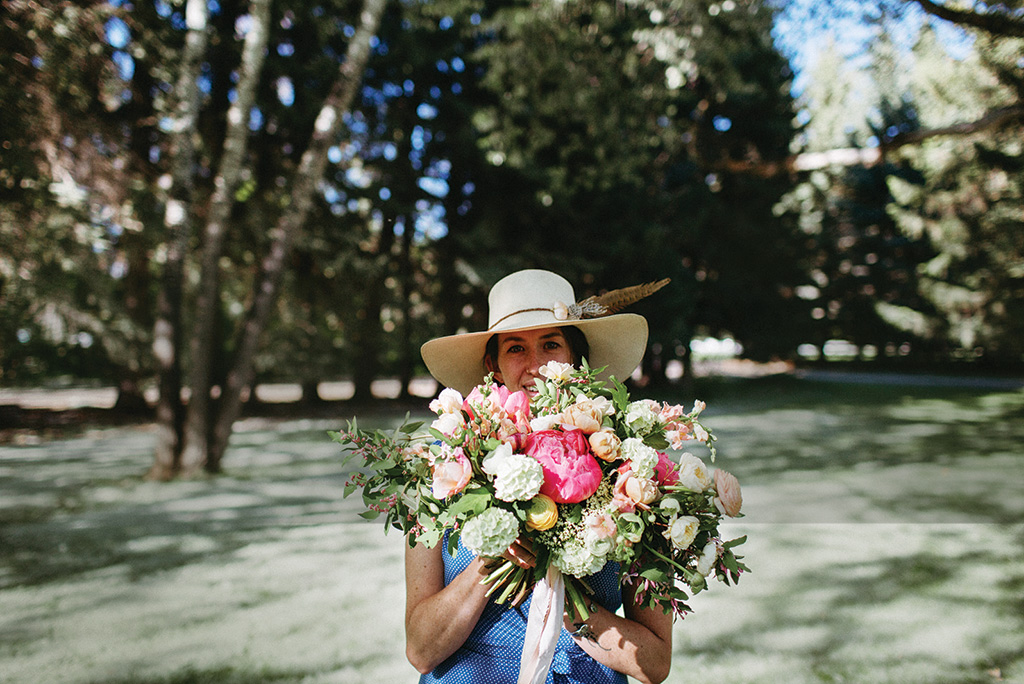
Though Sun Valley has become a genuine mecca of weddings and provided Cavanaugh ample customers, there are some challenges to running a flower business in the Idaho mountains, most notably the fact that it’s a desert. “It’s not the easiest place to grow flowers, that’s for sure,” Cavanaugh says.
In fact, flower growing in general is a relatively resource-heavy process, and one of Floret’s key tenets is working to ensure they only source the most sustainable flowers, opting for locally grown flowers whenever possible. And in this endeavor, she’s not alone. Cavanaugh points out that one of the best parts about working in a small remote town is the sense of community among everyone she works with. “Everyone is focused on small town community over competition, and we’re always helping each other out, from growers to all the different florists.”
As the Valley gets back to a new version of the pre-pandemic normal, the weddings and events are once again filling the summer and fall calendar. “I’m excited to get back into more of a full season,” says Cavanaugh. “And I really want to start pushing my designs and help people break out of that traditional rustic look that’s been done for so long here.” For Floret and many local businesses dependent on the events season, it is safe to say this summer will afford them all the opportunity to continue supporting each other, making it the most successful season yet.


